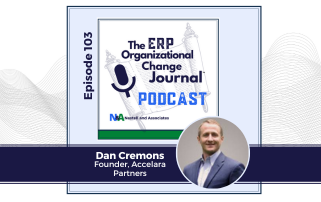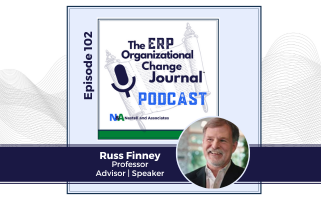In ERP organizational change efforts, a culture of trust is a significant influence that affects organizational performance.
“Similarly, some of the best business and nonprofit CEOs I’ve worked with over a 65-year consulting career were not stereotypical leaders. They were all over the map in terms of their personalities, attitudes, values, strengths, and weaknesses. They ranged from extroverted to nearly reclusive, from easygoing to controlling, from generous to parsimonious. What made them all effective is that they followed the same eight practices.” -Peter Drucker
Exploring Drucker’s Insights on Trust in ERP Success
To grasp the essence of trust in effective leadership and organizational change, let’s turn to the work of Peter Drucker. Drucker, renowned for his expertise in management principles, emphasized the pivotal role of trust in guiding leaders toward success. He noted, “When it comes to effective leadership and effective organizational change, trust is a general and significant theme.” Furthermore, Drucker’s observations of successful CEOs underscore the diverse nature of leadership styles, all unified by adherence to a common set of practices. Among these practices, Drucker highlighted the importance of fostering collective responsibility, stating, “One such common denominator amongst effective leaders is trust.” He emphasized the need for leaders to prioritize organizational needs over personal agendas, asserting, “Your authority comes from your organization’s trust in you.”
Trust and Constructive Conflict: Pertinent To ERP Success
Understanding the interplay between trust and conflict within ERP projects and its impact on organizational outcomes sets the stage for exploring how these elements affect the efficiency and success of ERP implementations. Let’s look at specific dynamics and implications of trust and conflict within organizational change processes.
Impact of Conflict on ERP Projects
Conflicts of interest among different functional departments are common in ERP organizational change efforts and lead to time delays, budget overages, miscommunications, and potentially project failure. Lee and Myers (2004) highlight that conflict over ERP organizational change strategy can lead to failed efforts as well as increased project cost and failure to deliver anticipated benefits.
Role of Trust in Constructive Conflict
Researchers have noted that trust advocates for constructive conflict, as opposed to conflict avoidance or defensive or hostile attitudes. Trust also advocates for achieving the goal of learning and sharing in an organization. This is supported by the findings of Ke & Wei (2008) and Kotter (2007), who observe that successful organizations have effective settings, processes, and support for appropriate conflict resolution. Ke and Wei (2008) suggest that healthy organizational cultural settings welcome conflicts and risks and also have employees who lack political motives and cooperate and assist each other. Recognizing the critical value and role of conflict management, Jehn and Bendersky (2003, p. 229) suggest that building trust and addressing conflict management and success lies in team leaders’ abilities to “successfully harness conflict’s constructive potential in organizations.”
Tolerance for Conflict as a Cultural Trait
Trust advocates for tolerance for constructive conflict. And, tolerance for conflicts is an important characteristic of an organization attempting ERP assimilation. This notion is supported by various studies including Al-Mashari (2018), Kholeif et al. (2013), and Kim, Lee, & Gosain (2005). Increased levels of organizational trust promote teamwork and behavior that increase organizational performance, as noted by Evaristo (2003). Organizations with a general understanding that conflict is natural but can and must be managed through a culture of trust increase their likelihood of ERP organizational change success.
Trust and Organizational Performance
During an ERP organizational change effort, the organization benefits from a culture of trust and constructive conflict. A culture that advocates tolerance for conflicts needs to also advocate for a culture of trust. Trust and conflict as critical success factors have rightfully garnered research interest and support, including studies by Antoniadis et al. (2015), Gefen (2004), Kim et al. (2005), Majed (2018), and Rouhani & Ravasan (2012). In ERP organizational change efforts, a culture of trust is a significant influence that affects organizational performance. Trust plays a role in constructive conflict as well as, ultimately, organizational performance and success.
Cultivating Trust in ERP Projects: Enhancing Private Equity Outcomes
Exploring the impact of trust on conflict management and project success in private equity settings reveals insights that are crucial for leaders in ERP organizational change.
The Fundamental Role of Trust and Conflict Management
For the participants in this study, if the value of tolerance for conflict was not understood from the onset of the project, it was certainly valued as a lesson learned. This study supports the notion that ERP organizational change success is related to and impacted by a culture of trust and constructive conflict. Moreover, there was a general sense that conflict is natural but can and must be managed.
Anecdotal Evidence from the Field
When discussing conflict, one participant sarcastically stated, “Yeah. We certainly had a couple.” Additionally, participating stakeholders provided evidence in knowledge and value that relational conflicts can play a negative role in ERP team performance. This study demonstrates that conflict is no stranger to even successful implementations. The notion of conflict and trust was a common theme as noted by qualitative coding.
Insights from Stakeholder Communications
As a further example, another participant provided insight on the topic of conflict and trust stating that “clear communications, by which evolves trust and respect between the participants vertically and horizontally, that’s the basis of it without, without, that it doesn’t matter what the details of the program are.”
Continuous Trust Throughout Project Lifecycles
“During ERP organizational change, many stakeholders face great demand and significant risks and challenges. To realize the greatest effectiveness and efficiencies, these challenges require significant trust. This study directly supports the notion that executive stakeholder groups that promote cohesiveness and manage and reduce conflict will improve overall organizational success. Moreover, this process of advocating a culture of trust needs to be continuous throughout the entire project lifecycle. This is because, as Besson and Rowe (2001) allude and as suggested by this study, is that as ERP projects progress, stakeholders can change their attitude and positions regarding the project as well as their perspective of other stakeholders.”
Trust Promotes Teamwork and Effective Communication
“The results of this study suggest that increased levels of organizational trust promote teamwork. In general, the executive stakeholders emphasized effective and consistent communication. They were quite cognizant of being aware of conflict. They were decisive in addressing conflict, and they were consistent and honest in their communications, further promoting a culture of trust. The evidence of this study supports and is consistent with results obtained by Han and Harms (2010) in that the executive stakeholders were able to promote a sense of organizational team and teamwork that reduced relationship conflict and improved trust in coworkers.”
In summary, the sustained cultivation of trust throughout the ERP project lifecycle not only mitigates conflicts but also enhances the overall project outcomes, affirming the essential role of trust in achieving ERP success.
Dr. Jack G. Nestell
Explore a Partnership with Nestell & Associates
At Nestell & Associates, we’re dedicated to helping leaders like you achieve transformative results through strategic ERP implementation. If you’re aiming to enhance your organization’s performance and trust dynamics, why not start a conversation with us to see how we can support your goals?
Article References
- Al-Mashari, M. (2018). “Process orientation through enterprise resource planning (ERP): a review of critical issues – Al‐Mashari – 2001 – Knowledge and Process Management – Wiley Online Library.”
- Antoniadis, I., et al. (2015). “Business intelligence during times of crisis: Adoption and usage of ERP systems by SMEs.” Procedia-Social and Behavioral Sciences 175: 299-307.
- Besson, P., and Rowe, F. (2001). “ERP project dynamics and enacted dialogue: perceived understanding, perceived leeway, and the nature of task-related conflicts.” Database for Advances in Information Systems 32(4): 47-66.
- Clark, R. E., and Estes, F. (2008). “Turning research into results: A guide to selecting the right performance solutions.” Information Age Publishing.
- Drucker, P. (2011). “What Makes an Effective Executive.” Harvard Business Review.
- Evaristo, R. (2003). “The management of distributed projects across cultures.” Journal of Global Information Management (JGIM) 11(4): 58-70.
- Gefen, D. (2004). “What Makes an ERP Implementation Relationship Worthwhile: Linking Trust Mechanisms and ERP Usefulness.” Journal of Management Information Systems 21(1): 263-288.
- Han, S., and Harms, P. (2010). “Team Performance in the ERP Implementation Space: The Role of Leadership.” Journal of Applied Business Research 26(2): 83-94.
- Jehn, K. A., and Bendersky, C. (2003). “Intragroup conflict in organizations: A contingency perspective on the conflict-outcome relationship.” Research in Organizational Behavior 25: 187-242.
- Ke, W., and Wei, K. K. (2008). “Organizational culture and leadership in ERP implementation.” Decision Support Systems 45(2): 208-218.
- Kholeif, A. O. R., et al. (2013). “ERP customization failure.” Business Process Management Journal 11(2): 158-170.
- Kim, Y., Lee, Z., and Gosain, S. (2005). “Impediments to successful ERP implementation process.” Business Process Management Journal 11(2): 158-170.
- Kotter, J. P. (2007). “Leading Change: Why Transformation Efforts Fail.” Harvard Business Review.
- Lee, J. C., and Myers, M. D. (2004). “Dominant actors, political agendas, and strategic shifts over time: a critical ethnography of an enterprise systems implementation.” Journal of Strategic Information Systems 13(4): 355-374.
- Majed, Z. (2018). “The Role of Trust in ERP System Implementation.” Journal of Enterprise Information Management.
- Rouhani, S., and Ravasan, A. Z. (2012). “ERP success prediction: An artificial neural network approach.” Scientia Iranica.
Latest Podcast Episodes – “The ERP Organizational Change Journal”
Human Capital in PE-Backed Companies: Strategies for Leadership and Talent Management
Human Capital in PE-Backed Companies: Strategies for Leadership and Talent ManagementEpisode Overview - PE-backed Human Capital Strategies Today’s episode centers on the pivotal role of human capital in PE-backed companies, emphasizing how strategic leadership and...
ERP Organizational Change: Technology Strategy
ERP Organizational Change: Technology Strategy and Keys to SuccessEpisode Overview - Technology Strategy In general, at the highest level of categorization, there seems to be consensus on the importance of people and culture, informational technology, and project...
AI and Private Equity Synergy: Fueling Business Transformation
AI and Private Equity Synergy: Fueling Business TransformationEpisode Overview - AI in PE Strategies In this episode, we explore how AI and Private Equity synergies are fueling business transformations and reshaping investment strategies and operational efficiencies....




